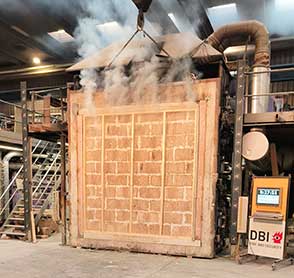Published: 22.10.24
DBI has tested and demonstrated that a biogenic cladding wall’s fire resistance can meet the EI 30 fire classification. The scalability of the project now makes it possible to fire-protect a wide range of biogenic insulation materials with the tested construction.
In the construction industry, sustainability and combustibility are often in conflict. The use of biogenic insulation materials can reduce the environmental impact of construction, but these materials generally have poor fire properties, requiring fire protection measures.
Currently, there are very few bio-based fire-protection products approved for EI 30. Bio-based insulation materials such as straw and grass typically only achieve a material class of E. Consequently, building regulations – such as for single-family homes – impose stricter protection requirements on the insulation, where the material must be covered with cladding in at least class K1 10 / B-s1, d0, or EI 30.
This challenge has been the focal point of a project funded by WE BUILD DENMARK, the Danish Business Promotion Board, and the European Union, where DBI (The Danish Institute of Fire and Security Technology) has tested fire resistance.
“The goal of the project has been to investigate how a biogenic wall structure can be used for fire protection in accordance with EI 30. It was based on a specific construction project using a cladding wall made of hempcrete blocks with lime plaster,” explains Christen Kjer-Hansen, Project Manager in Advanced Product Development at DBI.
“To pass the requirements for EI 30, the cladding wall needed to withstand fire for 30 minutes. In our fire test, it lasted 46 minutes, so it more than passed,” elaborates Christen Kjer-Hansen.
As a fire protection system, EI 30 is very scalable, as the system can be used to protect biogenic insulation that performs worse than D-s2, d0, allowing for wide application. Therefore, the solution can be implemented in many different types of construction.
“This is not a large project but an important one, because it provides the scalability that is so critical for the market. Now, any biogenic insulation material can be fire-protected using the given construction,” explains Christen Kjer-Hansen.
“At DBI, we are pleased to contribute to projects like this. Not only because the documentation ensures scalability, but also because we can offer customers a holistic approach to fire protection, using our expertise in both Fire Testing, Fire Consultancy, and Advanced Product Development.”
The innovation collaboration is based on a townhouse with three units, each 100 m², built by A. Enggaard and JDH-BYG. The outer walls are made of biogenic materials such as straw, industrial hemp, clay, lime, and wood. The outer walls consist of straw-based elements from Ecococon, cladded with hempcrete blocks from Havnens Hænder with lime plaster on the outside and clay plaster on the inside. DBI has tested the fire resistance of the cladding, meeting EI 30 requirements.
The project is funded by WE BUILD DENMARK, the Danish Business Promotion Board, and the European Union.

Christen Kjer-Hansen
Project Manager
